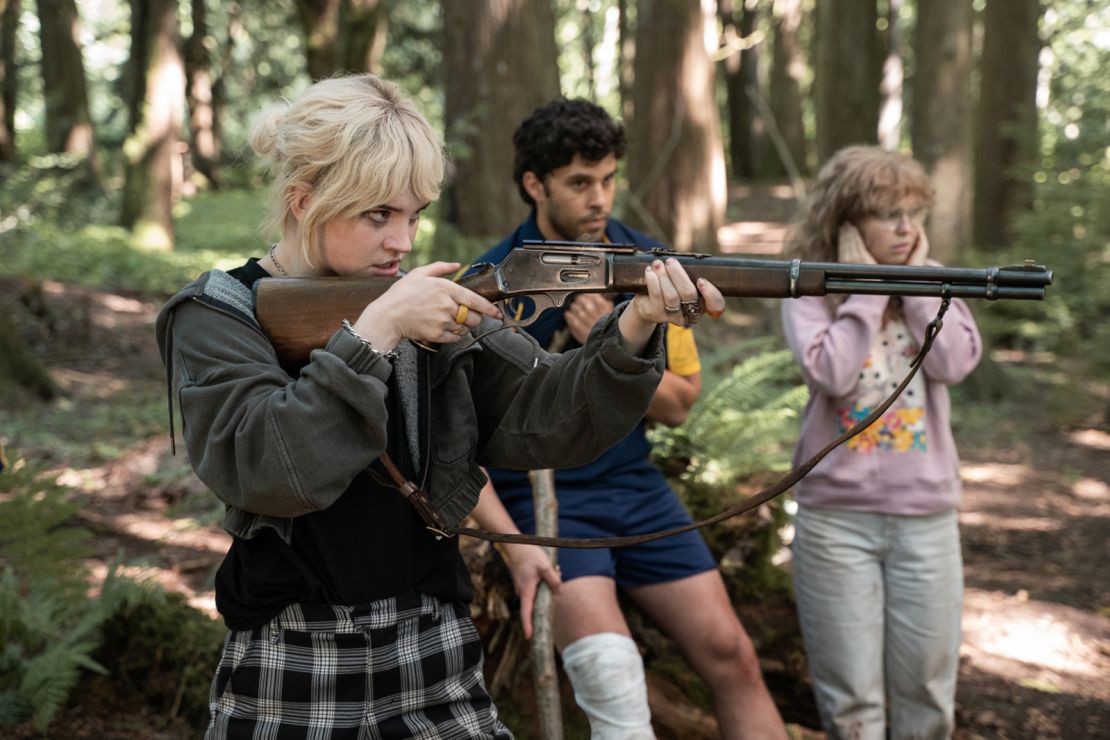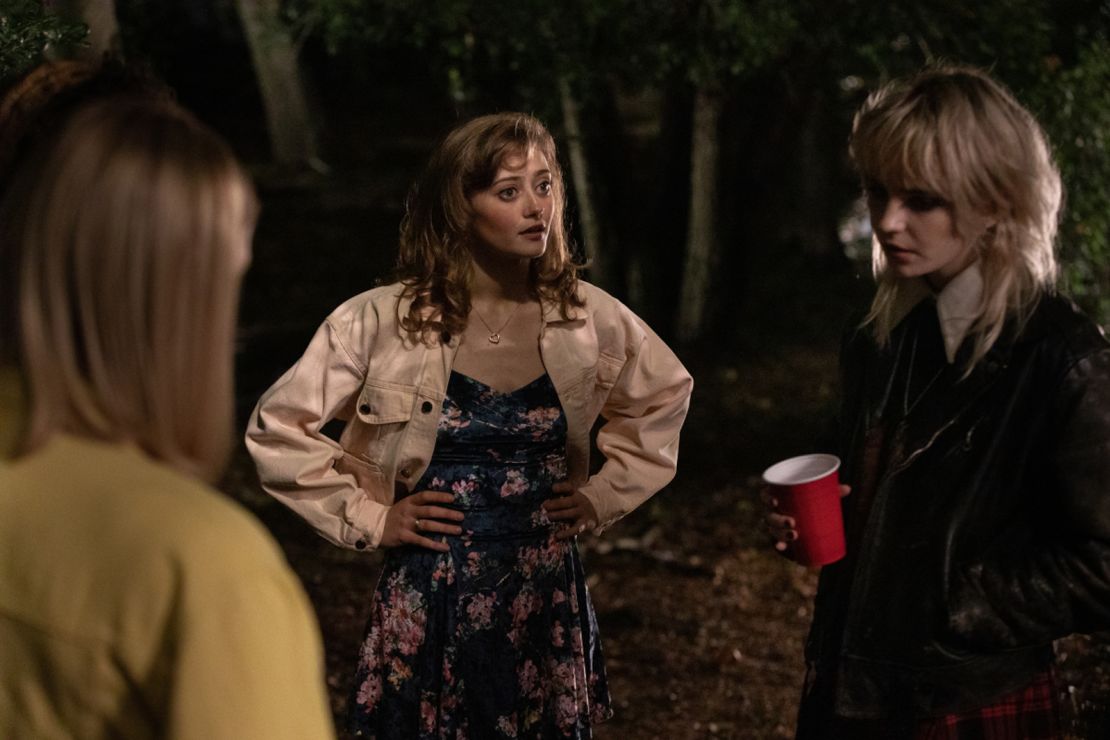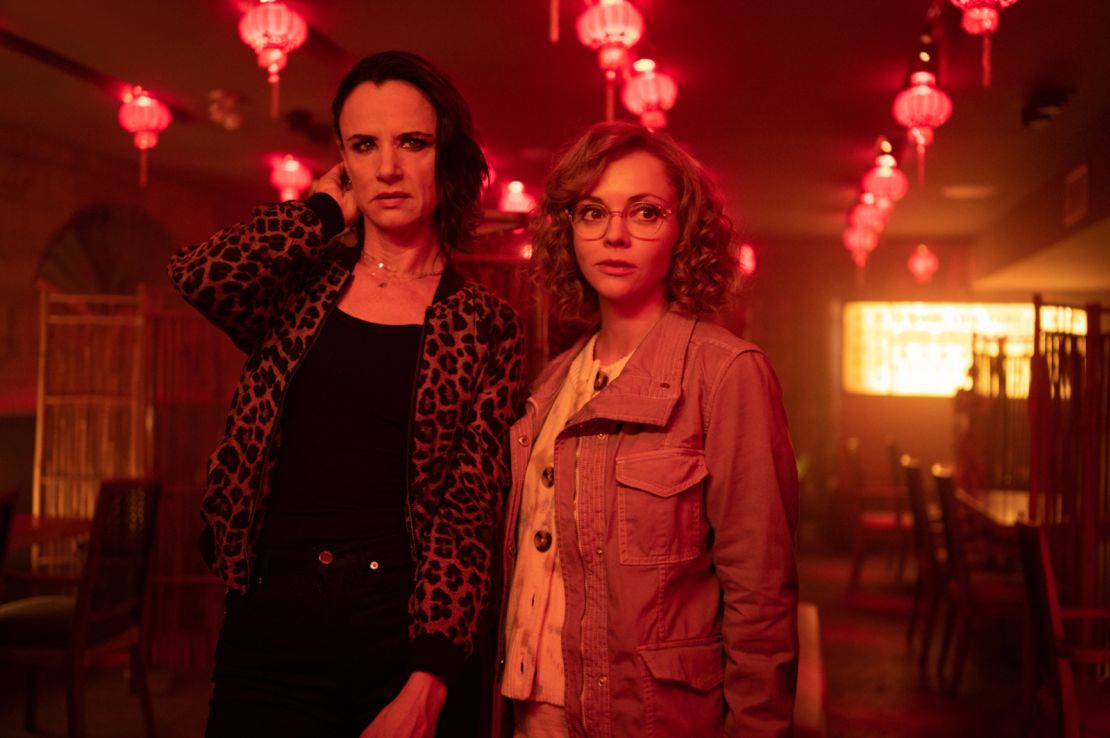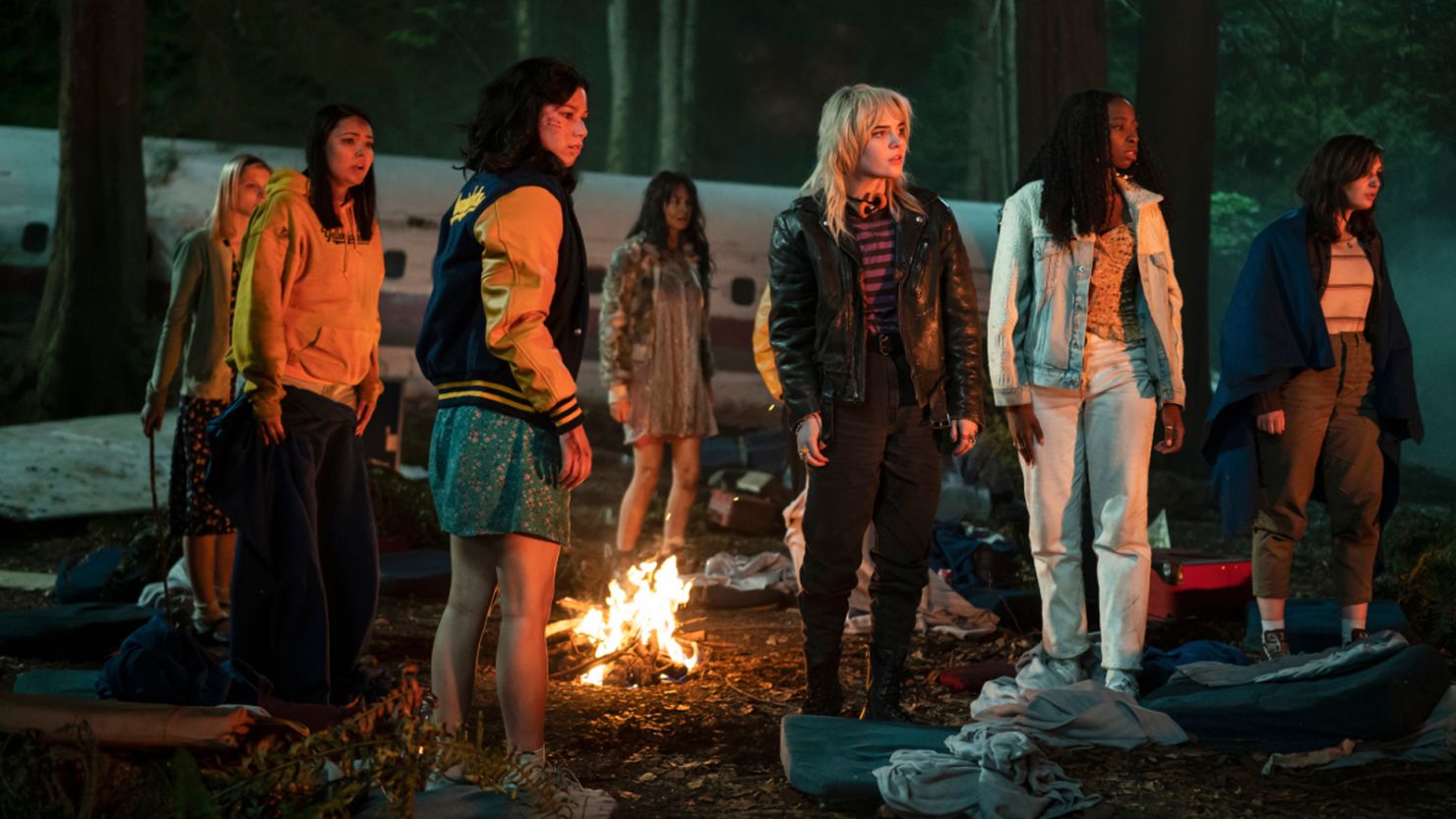Editor’s Note: Sara Stewart is a film and culture writer who lives in western Pennsylvania. The views expressed here are solely the author’s own. View more opinion articles on CNN.
(Note: Some spoilers follow for the episodes of “Yellowjackets” that have already aired.)
The “Yellowjackets” pilot begins with a shriek: A young woman, glimpsed only from the back, runs screaming through a snowy forest, barefoot and nightgowned, before falling to her death in a pit lined with sharp sticks. An animal-skin-clad figure gazes into the hole, and we get a glimpse of its shoes: they’re totally cute pink Converse.

Showtime’s addictive new series about a high school girls’ soccer team marooned after a plane crash, and the aftermath of that time in the characters’ lives as 40-something adults, is many things at once. Horror. Survival drama. 1990s nostalgia trip. Teen coming-of-age dramedy. “Lost”-like thriller. It is a level of good that deserves a lot more viewership than it’s getting, despite the swell of critical interest. (Side note to streaming services: Why on earth aren’t you offering more channel bundles?)
More crucially, the series itself is a well-laid trap, with a searing 21st-century gender critique in the offing, luring us in with the promise of supernatural scares, big reveals, splashes of gore and throwback songs. At its core, it’s an exploration of female rage, intuition and trauma. (With a side of cannibalism.)
Unlike shows that privilege singular moments in the lives of women and girls (with a predisposition to “young mom” or “hot teenager” eras), “Yellowjackets” ping-pongs deliberately between two fraught phases of womanhood, teenage and middle age. It’s also, hilariously, a retort to some man who said of an all-female “Lord of the Flies” proposal: “What are they going to do, collaborate to death?”

Excuse me while I LOL. Teenage girls contain multitudes, but gentle collaborators they are not. Karyn Kusama (“Jennifer’s Body,” “Destroyer”) directed the pilot, and in a recent interview she spoke of those formative years in combat terms: “[O]ne of the things I kept talking about with them and I felt like they really responded to was the idea of female war stories. The ways that we carry our past, carry our most traumatic experiences, and bring them forward with us into the present.” As co-creator Ashley Lyle has observed, anyone who’s ever been a teen girl will know this to be true.
Though trauma is dialed up to extreme (possibly supernatural) levels in the woods, it’s seeded before the crash in less mythical ways. Teen Natalie (Sophie Thatcher) endures an abusive father at home (until she doesn’t). Team captain Jackie (Ella Purnell) is shown having a clumsy, painful sexual encounter with her boyfriend, feigning an orgasm so he’ll stop already. She dismisses the team’s pep rally as mostly “to give freshmen something to jerk off to,” and flips the bird at a marquee in their town lauding a boys’ team instead of the nationals-bound Yellowjackets. Taissa (Jasmin Savoy Brown) fouls a teammate so brutally the girl’s shinbone is left jutting out of her leg. Two of the girls nearly get into a fistfight at a keg party. And the team’s deeply quirky manager, Misty (Samantha Hanratty), gets a prank call from girls who lob acid insults.

The pivotal events of “Yellowjackets” are set in 1996, squarely in the middle of the decade that has dominated pop-cultural nostalgia recently. But its dark tone reflects a dissonance in that era rarely addressed: On one hand, messages of female empowerment coming out of music, television and film (think riot grrrls, “Buffy,” and “The Craft”), and on the other, rampant misogyny and sexism (think Anita Hill, Nicole Simpson jokes, all the sexual harassment now coming to light in #MeToo). As Kusama has said, “[t]he way we’re looking back at girls’ and women’s lives of that period, it’s interesting we’re finally reckoning with the ways our culture specifically chews women up and spits them out, then blames them for landing in a million little pieces.”
So what happens when you rip teenage girls out of that culture? In the world of “Yellowjackets,” they turn out to be highly capable. Natalie can hunt. Shauna (Sophie Nelisse) can field dress a kill. Laura Lee (Jane Widdop) learns to, um, fly a plane. Misty, for all her dementedness, has EMT skills and a working knowledge of medicinal plants. One of the Yellowjackets boils used menstrual pads alongside the pot with breakfast in it. You do what you gotta do.

And once you’ve tasted a wild existence, the show suggests, it’s hard to fit back into the confines of civilization. In current-day segments, the four main survivors are now in their 40s: Shauna (Melanie Lynskey), Natalie (Juliette Lewis), Misty (Christina Ricci) and Taissa (Tawny Cypress). Each lives, precariously, with the secrets of those months in the wilderness. Natalie, who’s finishing her latest stint in rehab, claims she’s learned to “keep the tiger in the cage.” But has she? Or the other three?
Homemaker Shauna protects her garden by spearing a rabbit with a shovel, then butchering it and secretly serving it for dinner. Natalie steals an old friend’s gun, and blackmails another. Misty is an Annie Wilkes-esque home care nurse (Hanratty and Ricci have already made the terrifying Misty a fan favorite). Taissa is a type-A lawyer who’s running for state senate; she spends some of her nights crouched in a tree outside her house, in a trance, wild-eyed, eating dirt.
Taissa’s psychic split reminded me of the 1989 book “Women Who Run with the Wolves,” in which author Clarissa Pinkola Estes wrote about the Wild Woman archetype: “We are all filled with a longing for the wild. There are few culturally sanctioned antidotes for this yearning. We were taught to feel shame for such a desire. We grew our hair long and used it to hide our feelings.
But the shadow of Wild Woman still lurks behind us during our days and in our nights. No matter where we are, the shadow that trots behind us is definitely four-footed.” (Not for nothing does adult Taissa spot, or possibly hallucinate, a wolf outside her house.)
Estes’ book had a resurgence a couple of years ago, and its themes have popped up all over the place. The movies “Portrait of a Lady on Fire” and “Promising Young Woman” were dazzling works about women transgressing cultural norms. The fiction podcast “Soft Voice” follows a young woman torn between two voices in her head.
In the New York Times, Amanda Hess writes of the off-Broadway show “Dance Nation,” about a girls’ dance troupe: “One girl smears menstrual blood on her face like war paint; another fantasizes about giving birth, smashing her newborn’s head on the rocks and force-feeding the corpse to her rivals. At their wildest, the girls fuse into a wolf pack, donning fangs and snarling at the moon.” Look for similar vibes in this Sunday’s episode.
It’s interesting to see “Yellowjackets” exist in the same media landscape as “And Just Like That,” which also purports to be about women in middle age. For every note that rings false in the “Sex and the City” update – and there have been many – there’s a truly moving scene from the adult Yellowjackets, none of whom could be considered conventionally ‘likable.’ Their psychological messiness rings a lot truer than Carrie’s platitudes, especially right now.
Perhaps the horrors of “Yellowjackets” will prove cathartic. As Estes wrote, “even raw and messy emotions can be understood as a form of light, crackling and bursting with energy. We can use the light of rage in a positive way, in order to see into places we cannot usually see.”

